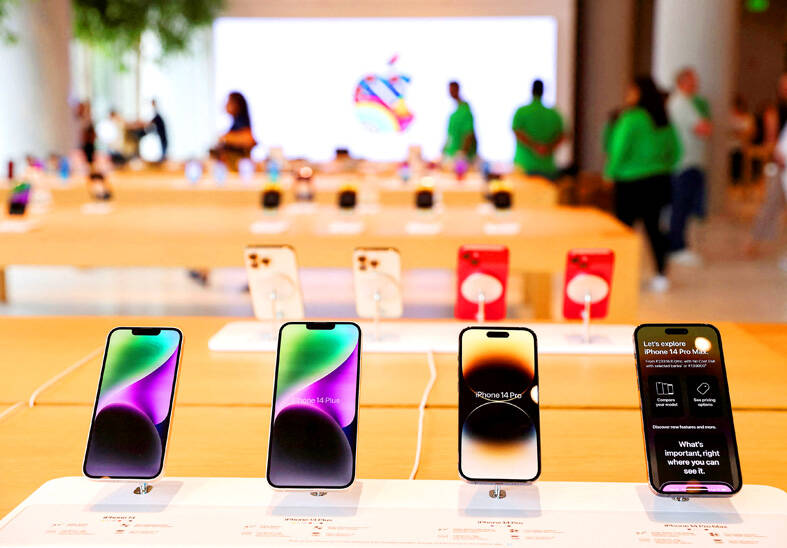Apple Inc assembled US$22 billion worth of iPhones in India in the 12 months ended last month, increasing production by nearly 60 percent over the previous year in a sign of continued diversification away from China.
The Cupertino, California-headquartered company now makes 20 percent, or one in five, of its prized iPhones in the South Asian country, people familiar with the matter said.
The dollar figure represents the devices’ estimated factory gate value, rather than the marked-up retail price.

Photo: Reuters
The ramp-up suggests the iPhone maker and its suppliers are accelerating a pivot to India from China. The bulk of India-made iPhones are assembled at Foxconn Technology Group’s (富士康) factory in southern India. Tata Group’s electronics manufacturing arm, which bought Wistron Corp (緯創) and controls Pegatron Corp’s (和碩) operations, is also a key supplier.
Of the total India production, Apple exported 1.5 trillion rupees (US$17.42 billion) in iPhones from the region in the fiscal year through last month, Indian Minister of Railways, Information and Broadcasting, and Electronics and Information Technology Ashwini Vaishnaw said on Tuesday last week.
Shipments of iPhones from India to the US accelerated after US President Donald Trump announced plans for “reciprocal” tariffs in February, the people said.
Apple’s average India production and exports surged all through the fiscal year to last month.
The Trump administration late on Friday exempted electronics goods including smartphones and computers from its reciprocal tariffs. That is good news for companies such as Apple and Nvidia Corp, although the reprieve does not appear to extend to Trump’s separate 20 percent duty on China, applied to pressure Beijing to crack down on fentanyl.
That also means iPhones made in India would not attract any duties as of now. Barring the exceptions made on Friday, Trump’s cumulative levies on China remain at 145 percent, and would likely force companies such as Apple to intensify their supply chain shift.
However, with nearly 200 suppliers and an overwhelming reliance on China, moves to other countries could take years to play out. Despite Trump’s ambition to have iPhones made in the US, Apple is unlikely to move production there any time soon due to factors including a shortage of facilities and labor needed to produce the devices.
Apple now assembles its entire iPhone range in India, including the more expensive titanium Pro models. Its manufacturing success in the world’s most populous nation is also helped by state subsidies tied to Indian Prime Minister Narendra Modi’s ambition to turn the country into a manufacturing hub.
Modi is also seeking to widen electronics component manufacturing with US$2.7 billion in new financial incentives, and is focused on advancing its semiconductor ambitions.
Apple has a nearly 8 percent market share in India’s smartphone market, where its sales — a bulk of those from iPhones — reached almost US$8 billion in fiscal 2024.

South Korea’s equity benchmark yesterday crossed a new milestone just a month after surpassing the once-unthinkable 5,000 mark as surging global memory demand powers the country’s biggest chipmakers. The KOSPI advanced as much as 2.6 percent to a record 6,123, with Samsung Electronics Co and SK Hynix Inc each gaining more than 2 percent. With the benchmark now up 45 percent this year, South Korea’s stock market capitalization has also moved past France’s, following last month’s overtaking of Germany’s. Long overlooked by foreign funds, despite being undervalued, South Korean stocks have now emerged as clear winners in the global market. The so-called “artificial intelligence

NEW IDENTITY: Known for its software, India has expanded into hardware, with its semiconductor industry growing from US$38bn in 2023 to US$45bn to US$50bn India on Saturday inaugurated its first semiconductor assembly and test facility, a milestone in the government’s push to reduce dependence on foreign chipmakers and stake a claim in a sector dominated by China. Indian Prime Minister Narendra Modi opened US firm Micron Technology Inc’s semiconductor assembly, test and packaging unit in his home state of Gujarat, hailing the “dawn of a new era” for India’s technology ambitions. “When young Indians look back in the future, they will see this decade as the turning point in our tech future,” Modi told the event, which was broadcast on his YouTube channel. The plant would convert

‘SEISMIC SHIFT’: The researcher forecast there would be about 1.1 billion mobile shipments this year, down from 1.26 billion the prior year and erasing years of gains The global smartphone market is expected to contract 12.9 percent this year due to the unprecedented memorychip shortage, marking “a crisis like no other,” researcher International Data Corp (IDC) said. The new forecast, a dramatic revision down from earlier estimates, gives the latest accounting of the ongoing memory crunch that is affecting every corner of the electronics industry. The demand for advanced memory to power artificial intelligence (AI) tasks has drained global supply until well into next year and jeopardizes the business model of many smartphone makers. IDC forecast about 1.1 billion mobile shipments this year, down from 1.26 billion the prior

People stand in a Pokemon store in Tokyo on Thursday. One of the world highest-grossing franchises is celebrated its 30th anniversary yesterday.